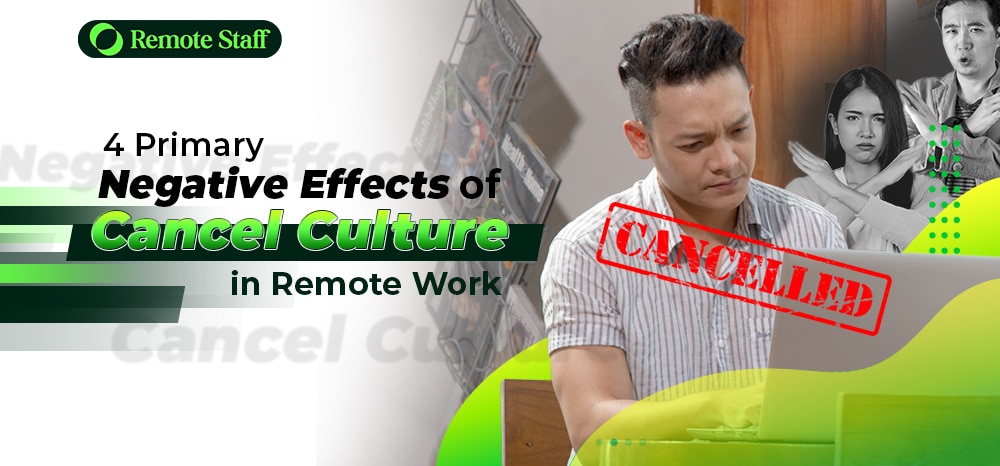By now, many of us have heard about Cancel Culture. This phenomenon has been the subject of heated debates between those who support it and those against it.
But what is it exactly? Cancel culture is the phenomenon involving the ostracism of a person, place, or organization because they behaved or said something unacceptable.
Examples of cancel culture include the condemnation on Twitter of author J.K. Rowling for her comments regarding transgender rights, as well as the backlash against the clothing brand Balenciaga after being accused of sexualizing children through their recent ad campaigns.
Cancel culture aims to hold people, particularly celebrities and big corporations, accountable for their words and actions. However, many say Cancel Culture promotes shaming instead of accountability and denies those canceled a chance to redeem themselves.
That said, it’s not only celebrities that get canceled. Cancel culture even happens to people working via remote work too. Nowadays, even telling a seemingly harmless joke could get you in trouble if the wrong person saw or heard it and took offense.
So, how does cancel culture affect people in remote work? Let’s find out.

Cancel Culture Stifles the Employees’ Ability to Express Themselves.
One of the main effects of cancel culture in remote work is heightened employee surveillance.
Today, employers can check your personal social media accounts to ensure you’re not posting offensive content that goes against company rules. Even your posts from years ago can be grounds for termination in some companies, despite you changing your views since then.
Yes, it’s crucial to ensure that the employee you’re hiring isn’t racist or homophobic. But there should still be a line between an employee’s private and professional life. Generally, what employees say or do outside of work shouldn’t be under a company’s jurisdiction.
This constant and frankly invasive form of monitoring can make employees feel restricted about what they can say and post, even in their personal accounts. This, in turn, negatively affects their productivity and trust in their employers.

Workspace Conflicts Can Get Out of Hand Because of It.
A potential problem with cancel culture is that it can be used by people for their own ends. If they have a co-worker they don’t like, they can accuse them of inappropriate behavior.
Unlike in an actual investigation, there’s no way to confirm whether someone’s accusations are true, especially once people start siding with the accuser.
Any attempt for discourse would be seen as siding with the accused by the people supporting the accuser. Worst case, you can end up being canceled as well.
But what if the accuser is wrong? What if they just over exaggerated their story to garner sympathy from others?
Well, guess what? You just ruined someone’s career over baseless rumors.

Cancel Culture Can Easily Escalate Into Bullying.
In theory, cancel culture promotes social justice and makes people accountable for their actions.
In practice? This turns into bullying when those being called out can’t defend themselves nor are allowed to apologize or atone for their errors. They’re ostracized by everyone they know unless they want to be canceled too.
In some cases, this can be justified, especially if the person who got canceled did something seriously wrong.
But what if it was an honest mistake? Or if they’ve changed their views since having made the offensive remark? Is ostracizing them a legitimate response, or can they be given a chance to redeem themselves instead?
Bullying those who stumble prevents them from learning from their mistakes and becoming a better person. Worse, this may make them double down on their beliefs instead of changing, since they may feel defensive once everyone starts attacking them already.

This Phenomenon Instills Fear and Mistrust in Employees.
Just because people aren’t canceling you doesn’t mean you aren’t or won’t be affected by it.
Besides experiencing peer pressure, employees become more anxious about what they say now. They become more guarded when interacting with their co-workers, fearing job loss due to cancel culture.
In addition, they’ll also become more mistrustful of their co-workers, which can seriously affect workplace coordination and morale.
Aside from losing trust in their co-workers, employees will also start doubting their company’s bosses and HR. After all, shouldn’t they be the ones handling matters like this instead of their fellow employees?
Cancel Culture: The Modern-Day Witch Hunt?
There’s nothing wrong with calling people out when they make offensive remarks. However, when people do it overzealously and with the intent of shaming and humiliating someone rather than helping them understand what they did wrong, that’s when it becomes a significant problem.
That’s the problem with cancel culture. The points mentioned above are just a handful of the main adverse effects of cancel culture in remote work.
If you’re looking for online jobs that offer a safe and welcoming workspace, Remote Staff is the place to go. We ensure that our partner companies offer a healthy work environment to our remote contractors.
Check out our jobs list to see which jobs you can apply to. Good luck!


